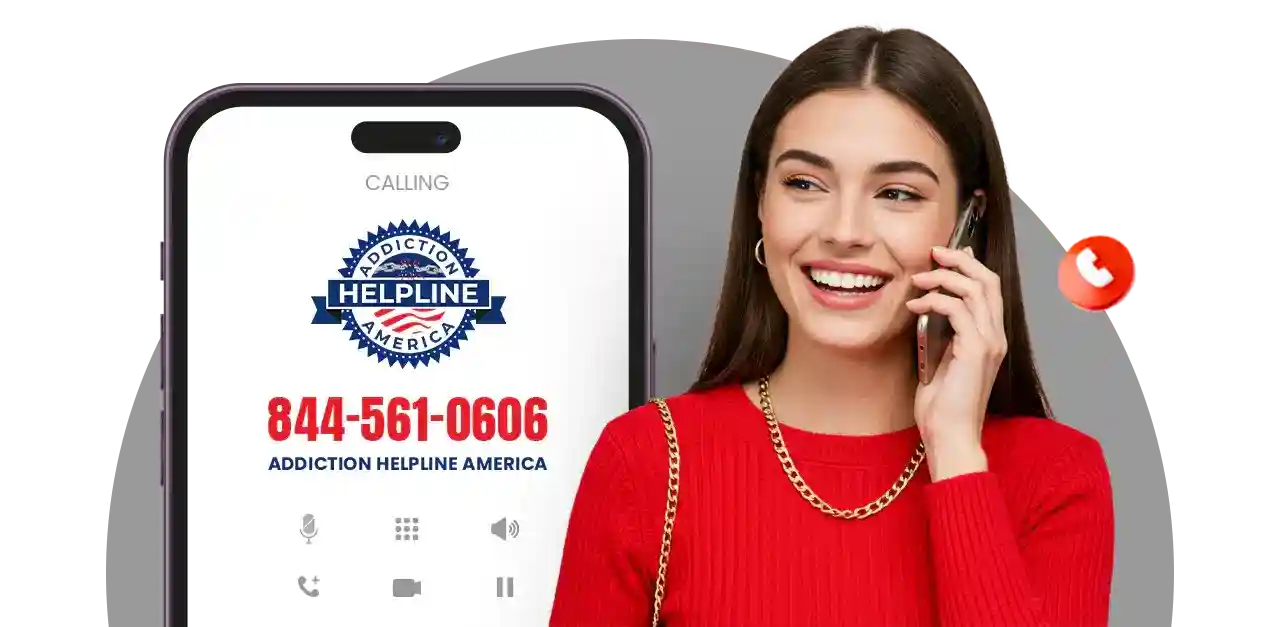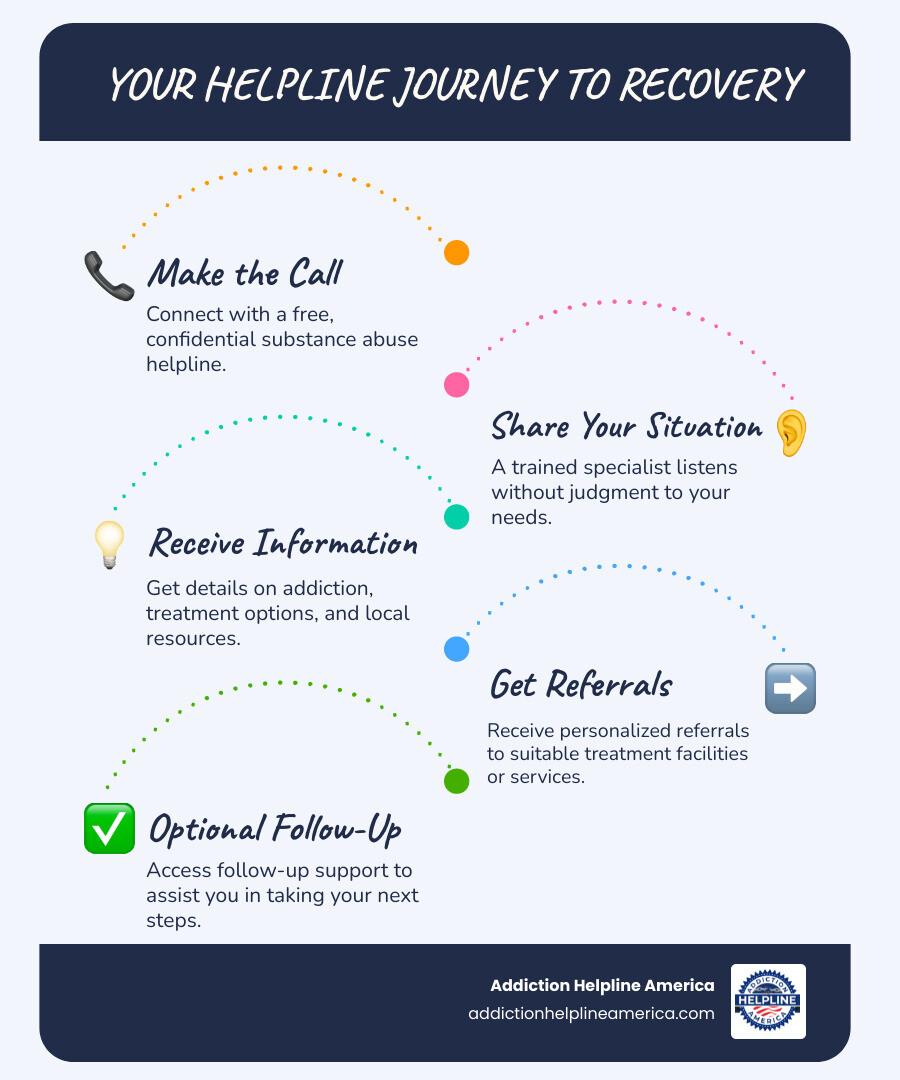
Why Reaching Out for Help Matters Now
A substance abuse helpline is a free, confidential service available 24/7. Trained specialists provide immediate support, crisis intervention, treatment referrals, and guidance for anyone affected by addiction—with no judgment or obligation.
Key Facts About Substance Abuse Helplines:
- Available 24/7 – Help is always a phone call away.
- Completely Free – No cost to call and no insurance required.
- Confidential & Anonymous – Your privacy is protected.
- Trained Specialists – Speak with experienced professionals who understand addiction.
- Immediate Support – Get crisis intervention, treatment referrals, and answers.
- For Everyone – Individuals, family members, and friends can all call.
The numbers tell a sobering story: nearly 49 million people in the U.S. have a substance use disorder, but only 1 in 4 who need specialty treatment receive it. This is a staggering treatment gap, but there is hope. Substance use disorder is a treatable disease, and recovery is possible with the right support.
A substance abuse helpline is designed to bridge the gap between desperation and recovery. It’s a critical first step when you need help but don’t know where to start. At Addiction Helpline America, we connect individuals and families with compassionate support and treatment resources nationwide. Our team is here 24/7 to guide you through every stage of the journey.
Explore more about substance abuse helpline:
What is a Substance Abuse Helpline and How Does It Work?
A substance abuse helpline is a direct line to support, available 24/7. It’s a powerful resource because it’s completely free and confidential. You don’t need insurance or money, and you can share as much or as little as you want without giving your name. Your conversation is protected, creating a safe space to speak honestly without fear of judgment.
When you call, you connect with trained specialists who have a deep knowledge of substance use disorders. They provide real emotional support and are skilled in crisis intervention. If you’re in immediate distress, they can guide you through it. They also play a vital role in addressing the stigma surrounding addiction, offering compassion and reinforcing that seeking help is a sign of strength. To better understand the disease, they can point you to resources like What is Drug Addiction?.
Who Can Call a Helpline?
Anyone who needs help or information about substance use can call. This includes:
- Individuals struggling with drugs or alcohol, no matter where they are in their journey.
- Family members and friends who feel helpless and need guidance on how to support a loved one while caring for themselves.
- Anyone needing information, such as teachers, counselors, or healthcare professionals looking for reliable resources.
What to Expect When Calling a Substance Abuse Helpline
Knowing what to expect can make calling less intimidating.
First, there is no judgment. The specialist understands addiction is a disease, and their only goal is to help. The call will start with a brief assessment of your needs to understand your situation. This helps them provide the most relevant guidance.
You’ll receive clear information on addiction and can learn about the Signs and Symptoms of Addiction. A key service is providing treatment referrals to appropriate resources, such as local facilities or support groups. They can also answer common questions people ask when calling a substance abuse helpline.
Most importantly, there is no obligation to commit to anything. A call is simply a conversation to gather information and explore your options. You remain in control of your journey.
Recognizing the Signs of a Substance Use Disorder
Recognizing a substance use disorder (SUD) can be difficult, as it’s a chronic disease that changes brain function, impulse control, and behavior. The core of SUD is compulsive use—continuing to use a substance despite knowing it’s causing harm. This isn’t a matter of willpower; it’s a result of addiction rewiring the brain.
The signs of SUD appear in three main areas:
- Behavioral Changes: These are often the first signs friends and family notice. A person might neglect responsibilities, withdraw from social activities, or become secretive.
- Physical Symptoms: Depending on the substance, you might see bloodshot eyes, sudden weight changes, poor personal grooming, tremors, or slurred speech.
- Psychological Signs: Mood swings, increased irritability, anxiety, or depression often accompany SUD.
If you recognize these signs in yourself or a loved one, a substance abuse helpline specialist can help you understand what you’re seeing. For more details, visit Signs and Symptoms of Addiction.
List of Common Warning Signs
Here are specific warning signs that may indicate a substance use disorder:
- Neglecting responsibilities at work, school, or home
- Increased tolerance (needing more to get the same effect)
- Withdrawal symptoms when trying to stop (e.g., nausea, tremors, anxiety)
- Relationship problems and social withdrawal
- Financial issues or unexplained money problems
- Secrecy and isolation about substance use
- Changes in appearance or personal hygiene
- Intense cravings for the substance
- Inability to control use despite wanting to quit
- Changes in sleep patterns
- Loss of interest in hobbies and activities
- Low libido or decreased sexual interest
Recognizing these signs is a signal that it’s time to have a conversation. Reaching out to a substance abuse helpline is a safe, confidential first step to get information and support.
Navigating Treatment with a Substance Abuse Helpline
Once you’ve decided to seek help, a substance abuse helpline can guide you through the maze of treatment options. The world of addiction treatment—from detox to therapy—can be overwhelming, but you don’t have to steer it alone.
When you call Addiction Helpline America, you get personalized guidance. We take the time to understand your unique situation, including work schedules, family responsibilities, and any co-occurring mental health conditions. Our goal is to connect you with facilities that match your specific needs and help you make informed decisions. For a comprehensive overview, visit Addiction Treatment.
Understanding Your Treatment Options
Recovery isn’t one-size-fits-all. A helpline specialist can explain the following options in plain language:
- Medical Detox: This is often the first step for physical dependence. It provides supervised, safe management of withdrawal symptoms, which can be dangerous for substances like alcohol or benzodiazepines. Learn more about Detox from Prescription Drugs.
- Inpatient Rehab: This residential treatment offers a structured, 24/7 supportive environment away from daily triggers. It allows for complete immersion in recovery. We can help you find Inpatient Rehabs Near Me.
- Outpatient Programs: For those who can’t step away from daily life, outpatient care provides flexibility. Standard programs involve a few therapy sessions per week, while Intensive Outpatient Programs (IOPs) offer more structure. Explore Drug Rehab: Intensive Outpatient.
- Virtual Rehab: Online treatment brings therapy and support groups to you through video sessions, offering convenience and privacy. Learn about Virtual Rehab options.
- Behavioral Therapies: Core to most programs, therapies like CBT and DBT teach you to change negative thought patterns and build coping skills for lifelong recovery.
- Dual Diagnosis Treatment: This integrated approach treats addiction and co-occurring mental health conditions like depression or anxiety simultaneously, significantly improving outcomes.
How a Substance Abuse Helpline Assists with Insurance
Cost is a major concern, and a substance abuse helpline can clarify the financial side of treatment. We can help verify your insurance benefits, explaining complex terms like deductibles and co-pays in plain English. Our specialists will outline what your policy covers and connect you with in-network providers to keep costs down. Addiction Helpline America partners with centers across all 50 states and D.C.
We can also discuss payment options like sliding scale fees or payment plans. If you don’t have insurance, we can provide information on state-funded programs that offer free or low-cost treatment.
Finding Support Groups and Aftercare
Completing a treatment program is the starting line for lifelong recovery. Ongoing support is essential for maintaining sobriety.
A substance abuse helpline connects you with long-term support systems:
- Support Groups: Peer groups provide a powerful sense of community. Popular options include Alcoholics Anonymous, Narcotics Anonymous, and SMART Recovery.
- Aftercare Plan: A solid plan is your roadmap for sobriety, including ongoing therapy, sober living arrangements, or vocational training.
- Family Support: Groups like Al-Anon and Nar-Anon offer support for family and friends.
For more tools, visit our Helpful Links and Resources page.
Specialized Support and Resources
When you call a substance abuse helpline, you’re not just getting general information—you’re accessing a gateway to specialized treatment options designed for specific types of addiction and unique personal circumstances. We understand that every person’s journey is different, and what works for one individual may not work for another.
One of the most effective specialized approaches is Medication-Assisted Treatment (MAT). This evidence-based method combines FDA-approved medications with counseling and behavioral therapies to treat substance use disorders. It’s particularly effective for opioid and alcohol dependence. Medications like buprenorphine, naltrexone, and methadone work by reducing cravings and easing withdrawal symptoms, making the path to recovery more manageable and sustainable. If you’re struggling with opioid addiction specifically, MAT can be a game-changer. A substance abuse helpline can explain how MAT works and connect you with providers who offer this integrated approach. To learn more, visit Find medication-assisted treatment (MAT) or explore specific options for Opioid Addiction Treatment.
Beyond MAT, there are various types of helplines available across the country. While national resources provide comprehensive support and referrals, many states and local communities operate their own dedicated helplines. These state-specific resources often have deeper knowledge of local treatment facilities, funding opportunities, and support groups in your immediate area. Whether you’re in Arizona, California, Florida, New York, Texas, or Wyoming—or anywhere in between—there are both national and local resources ready to help. Sometimes, connecting with a local helpline means finding programs that truly understand your community’s unique challenges and resources.
It’s worth noting that helplines also serve a broader purpose: they help chip away at the stigma surrounding substance use disorders. By offering a confidential, judgment-free space to talk openly about addiction, these services encourage people to step out of the shadows. Every call represents someone choosing vulnerability over secrecy, which is a powerful act of courage. When more people reach out, we collectively challenge the shame and silence that have long surrounded addiction.
Resources for Family and Friends
If someone you love is struggling with addiction, you’re likely feeling overwhelmed, scared, and unsure how to help. Here’s something important to remember: a substance abuse helpline is for you, too. You don’t have to be the person using substances to need support and guidance.
When you call, specialists can offer practical coping strategies for managing the stress, frustration, and heartache that come with loving someone in active addiction. They understand the emotional toll this takes on families. They can help you recognize patterns like codependency and teach you how to support your loved one without enabling harmful behaviors. This distinction—between helping and enabling—can be difficult to steer alone, but you don’t have to figure it out by yourself.
Learning to set healthy boundaries is one of the most important things you can do, both for your own well-being and to encourage your loved one to seek help. Boundaries aren’t about punishment or control—they’re about protecting your emotional health while creating space for your loved one to experience the natural consequences of their choices. Helplines can guide you through how to communicate these boundaries clearly and compassionately.
Beyond individual guidance, helplines connect you to family therapy programs and support groups specifically designed for people in your situation. Groups like Al-Anon and NAR-Anon provide safe spaces where you can share your experiences with others who truly understand what you’re going through. There’s tremendous strength in knowing you’re not alone. Learn more at Al-Anon or Nar-Anon.
Young people are especially vulnerable when a parent or guardian struggles with addiction. Teens often feel confused, guilty, or responsible for their loved one’s substance use. Resources like Alateen, which is part of the Al-Anon fellowship, offer specialized support for teenagers affected by someone else’s drinking or drug use. A helpline can direct you to these age-appropriate resources, ensuring that younger family members get the help they need too. Learn more about help for teens affected by someone else’s alcoholism.
For comprehensive support options and additional guidance, visit Help for families and friends. Seeking help for yourself isn’t selfish—it’s essential. You can’t pour from an empty cup, and taking care of your own emotional health makes you better equipped to support your loved one’s recovery journey.
Frequently Asked Questions about Substance Abuse Helplines
You’re not alone if you have questions about calling a substance abuse helpline. In fact, we hear the same concerns from many people who are considering reaching out for the first time. That hesitation is completely understandable—reaching out for help takes courage, and it’s natural to want to know what you’re getting into before you pick up the phone. Let’s address the most common questions we hear.
Is calling a substance abuse helpline confidential?
Yes, and we can’t emphasize this enough—your call is completely confidential and anonymous. When you reach out to a reputable substance abuse helpline, everything you share stays private. Your name, your story, the details of your situation, even the simple fact that you called—none of it will be shared with anyone without your explicit permission.
This confidentiality isn’t just a promise; it’s protected by privacy laws designed specifically to encourage people to seek help without fear. You won’t face judgment, legal consequences, or any negative impact on your job or personal reputation. We’ve created this safe space intentionally, so you can speak honestly about what’s really going on. Sometimes the hardest part of addiction is the secrecy and shame that surround it. A confidential helpline breaks through that barrier, giving you a place to be completely honest without worrying about the fallout.
Can I call on behalf of a loved one?
Absolutely, yes. In fact, many of the calls we receive come from family members, friends, and concerned loved ones who are worried about someone they care about. A substance abuse helpline isn’t just for the person struggling with addiction—it’s for everyone affected by it, and that includes you.
Maybe you’re a parent watching your child spiral. Maybe you’re a spouse who doesn’t know how to help anymore. Maybe you’re a friend who’s noticed troubling changes but doesn’t know how to start the conversation. Whatever your relationship to the person struggling, you can call. Our specialists can help you understand what you’re seeing, guide you on how to approach your loved one with compassion rather than confrontation, explain treatment options that might work for them, and connect you with support groups where you can find strength and community. You don’t need permission to seek guidance—caring about someone’s well-being is reason enough to reach out. For more comprehensive support custom to families, visit our family support resources.
Does calling a helpline mean I have to go to rehab?
No, not at all. This is one of the biggest misconceptions people have, and it stops many from making that first call. Let us be crystal clear: calling a substance abuse helpline creates zero obligation. You’re not signing up for anything. You’re not committing to treatment. You’re simply gathering information and exploring your options in a safe, pressure-free environment.
Think of it as a conversation, not a contract. The specialists on the other end are there to provide information about addiction and rehab hotlines, answer your questions, help you understand what resources exist, and support you in making the best decision for your unique situation—whatever that decision might be. Maybe you’ll decide treatment is right for you today. Maybe you’ll decide you need more time to think. Maybe you’ll realize you just needed someone to talk to who understands. All of those outcomes are completely valid. The power to decide your next steps stays entirely in your hands. We’re here to inform and guide, never to push or pressure.
Take the First Step Towards Recovery Today
Simply by reading this, you’ve shown you’re looking for a way forward. The most important thing to know is that help is available right now, and it starts with a single phone call to a substance abuse helpline.
Nearly 49 million Americans struggle with substance use disorder, but most don’t get the help they need. You can be the one to cross that treatment gap. A substance abuse helpline is the bridge from where you are to where you want to be.
These services offer free, confidential, personalized guidance with no judgment or pressure. Trained specialists are ready to listen, explain your options from detox to aftercare, and help you steer insurance.
At Addiction Helpline America, our mission is to connect you with the right help. We have a vast network of treatment centers across all 50 states and the District of Columbia, from Alabama to Wyoming. We take the time to understand your unique needs to find the right fit.
The hardest part is often making the call, but on the other side is compassion, understanding, and a clear path forward. Recovery is possible, and it can begin today.
Don’t wait. Hope and healing are available right now. Find the right help now by exploring addiction and rehab hotlines.
Your journey to recovery can begin today. We’re here to walk alongside you, every step of the way.
Our helpline is 100%
free & confidential
If you or someone you care about is struggling with drug or alcohol addiction, we can help you explore your recovery options. Don’t face this challenge alone—seek support from us.
Programs
Resources
Will my insurance
cover addiction
treatment?
We're ready to help
Find the best
drug or alcohol treatment
center
Are you or a loved one struggling with addiction? Call today to speak to a treatment expert.
















